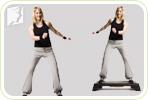
Exercise is a good way to help people who suffer from insomnia. People can suffer from insomnia at any age, but insomnia is especially common in menopausal and postmenopausal women. Research has shown that exercise of any kind can help treat insomnia and other sleep disorders. Jogging is a good option for many people, including menopausal women, because not only can it fight insomnia, but it is also good for a person's overall health.
Jogging and Insomnia
Learn more about jogging and exercise in general for the prevention of insomnia.
Are Sleep and Exercise Related?

Multiple studies and reports, including one from the American Academy of Sleep Medicine, have showed that there is a correlation between regular exercise and a reduction of insomnia. The studies show that through exercise, tension will decrease, and this reduces body temperature, making it easier to sleep and stay asleep.
How Strenuous Should the Exercise Be?

Research shows that you only need to jog five miles a week in order to reap the full benefits of regular exercise. However, you should choose an exercise schedule that is right for you. If you enjoy running marathons or going to the gym for an hour before work, then you can adapt your routine to this.
When Should You Exercise?

It is also important to note that exercising later in the day may worsen insomnia. This is not true for everyone, however, so it may be beneficial to give it a trial and error period to see if your insomnia is worsened by nighttime exercise.
Things to Remember

Exercise has been found to improve sleep quality and provides a safe, natural alternative to the use of sleep medications. Consider a wide range of exercises, including jump rope, kickboxing, cycling, and walking. Try finding a partner to exercise with or join a running club or gym. This can help you to keep motivated.
More about Jogging to Help Overcome Insomnia
Today, jogging is a popular form of exercise worldwide. It provides people with a cheap, quick, and fun way to get fit. In addition to helping to deal with insomnia, it also reduces stress and helps against many other menopause symptoms. Click on the following link for more information about menopausal insomnia.
Sources
- Morgenthaler, T. (2014). Does exercise late in the day cause insomnia? Retrieved November 30, 2015, from http://www.mayoclinic.org/healthy-lifestyle/fitness/expert-answers/exercise/faq-20058462
- National Sleep Foundation. (2010). How does exercise help those with chronic insomnia? Retrieved November 30, 2015, from https://sleepfoundation.org/ask-the-expert/how-does-exercise-help-those-chronic-insomnia



